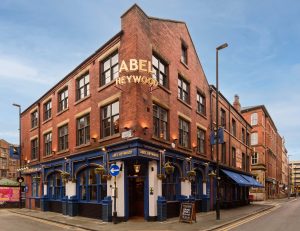Week Ending: A Blue Moon rises in Munich, and more

WEEK Ending was made to feel very much at home in Munich this week during an essential fact-finding tour of Bavaria’s brewing and sausage-making industries.
The trip, which conveniently coincided with the Manchester City’s Champions League fixture at Bayern Munich, saw an afternoon visit to the authentic German festive markets at Marienplatz.
Like the ever-expanding ersatz Manchester version, there’s stalls selling mugs of steaming gluwein, bratwurst sausages and of course wooden Christmas decorations.
The only things missing were the crowds – apart from the massed ranks of the travelling City fans – Munich’s markets were noticeably quieter than the Manchester version, which have been going for 15 years now.
Perhaps the novelty of the markets has worn off for Bavarians. Or maybe it was it was a chilly Tuesday, or maybe a combination of the two.
Surely it wasn’t because they weren’t that keen to share the evening with several thousand cheery, beery Mancunians can it?
::
BOOKIES will be turning toward Barbirolli Square and EY, now that Richard Bell has landed the top North West job at Deloitte in succession to the indefatigable Pat Loftus.
While Week Ending is sure there are no plans, nor any reason for EY’s top man Simon Allport to step down in the near future, Bell’s move up at Deloitte means that three of the the Big Four firms have changed senior leadership in the last 18 months.
First the youthful Iwan Griffiths took over at PwC, then Jonathan Hurst relinquished the reins at the Manchester office of KPMG for another Jonathan, Holt, and now Deloitte.
::
IT was heartening to see Manchester’s property agents putting the boot into George Osborne’s planned 2% cap on next year’s business rates increase. They saw it for what it was, an insignificant token gesture.
The move, unveiled in last week’s Autumn Statement, had been trailed in the national media with a heavy dollop of Government spin. This would be a lifeline to struggling businesses, they said – at a cost of around £300m to the Exchequer.
But this tax is squeezing the life out of thousands of businesses and a 2% increase, rather than the planned 3.2%, isn’t going to make much difference. Manchester surveyor Michael Blank calculated that a business in a property with a rateable value of £50,000 will save £283 over the year because its rates will rise from £23,550 to £24,021, rather than £24,304.
We hear many businesses are now paying more in rates than rents and it has become a number one business cost. It shouldn’t be like this, and a Government that says it is committed to supporting economic growth should overhaul the whole system. It could start by reinstating the 2015 revaluation which would deliver rates pegged to current property prices, rather than pre-crash levels of 2008.








